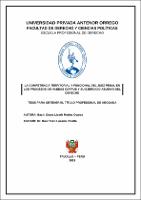Mostrar el registro sencillo del ítem
La competencia territorial y funcional del juez penal en los procesos de Habeas Corpus y su ejercicio abusivo del derecho
| dc.contributor.advisor | Lozano Peralta, Raúl Yván | |
| dc.contributor.author | Muñoz Oyarce, Diana Liceth | |
| dc.creator | Muñoz Oyarce, Diana Liceth | |
| dc.date.accessioned | 2019-11-28T21:16:21Z | |
| dc.date.available | 2019-11-28T21:16:21Z | |
| dc.date.issued | 2019 | |
| dc.identifier.uri | https://hdl.handle.net/20.500.12759/5717 | |
| dc.description.abstract | El presente informe de tesis tuvo como objetivo general, el determinar de qué manera la prórroga de la competencia territorial y funcional en el proceso de habeas corpus, prescrita en el artículo 28 del Código Procesal Constitucional, contraviene su naturaleza jurídica. En la etapa de recopilación de información para la elaboración de la dispersión temática de los capítulos del marco teórico, se utilizó las fuentes de consulta como son libros, revistas jurídicas, legislación nacional, jurisprudencia de la corte interamericana, empleando como instrumento de acopio de información las fichas de registro y de investigación. En cuanto a los resultados de la investigación desarrollados en los capítulos del marco teórico, se obtuvo que los procesos constitucionales tienen por finalidad garantizar la supremacía constitucional y la protección de derechos fundamentales, cuyo contenido es un derecho constitucional protegido; el proceso de habeas corpus se identifica como acción de garantía constitucional y como procedimiento donde su ámbito de aplicación es la libertad individual, la tutela procesal efectiva y sus derechos conexos a ella; y la eliminación de la prórroga de la competencia territorial y funcional del juez penal se fundamenta en la existencia de un ejercicio abusivo del derecho y en la proliferación de actos de corrupción entre los justiciables, sus abogados y magistrados. La conclusión principal del trabajo de investigación es que la prórroga de la competencia territorial y funcional en el proceso de habeas corpus prescrita en el artículo 28 del Código Procesal Constitucional contraviene su naturaleza jurídica, al permitir que dicha prerrogativa genere un ejercicio abusivo del derecho y fomente actos de corrupción, por lo que se recomienda la modificación del artículo 28 del Código Procesal Constitucional en donde la competencia recaiga en el Juez Penal de turno del lugar donde se produce la amenaza o afectación del derecho a la libertad individual y/o algún derecho conexo . | es_PE |
| dc.description.abstract | The general objective of this thesis report was to determine how the extension of territorial and functional competence in the habeas corpus process prescribed in Article 28 of the Constitutional Procedural Code contravenes its legal nature. In the information gathering stage for the elaboration of the thematic dispersion of the chapters of the theoretical framework, the sources of consultation were used, such as books, juridical magazines, national legislation, jurisprudence of the inter-American court, using as instrument of information gathering the registration and investigation files. Regarding the results of the research developed in the chapters of the theoretical framework, it was obtained that the constitutional processes are intended to guarantee the constitutional supremacy and the protection of fundamental rights whose content is a protected constitutional right; the habeas corpus process is identified as a constitutional guarantee action and as a procedure where its scope of application is individual liberty, effective procedural protection and its rights related to it; and the elimination of the extension of the territorial and functional competence of the criminal judge is based on the existence of an abusive exercise of the right and on the proliferation of acts of corruption among the defendants, their lawyers and magistrates. The main conclusion of the research work is that the extension of territorial and functional competence in the habeas corpus process prescribed in Article 28 of the Constitutional Procedural Code contravenes its legal nature, by allowing that prerogative to generate an abusive exercise of the right and promote acts of corruption, for which it is recommended the modification of Article 28 of the Constitutional Procedural Code where the competence falls on the criminal judge in turn of the place where the threat or effect of the right to individual freedom and / or any related right occurs . | en_US |
| dc.description.uri | Tesis | es_PE |
| dc.format | application/pdf | es_PE |
| dc.language.iso | spa | es_PE |
| dc.publisher | Universidad Privada Antenor Orrego - UPAO | es_PE |
| dc.relation.ispartofseries | T_DERE_478 | |
| dc.rights | info:eu-repo/semantics/closedAccess | es_PE |
| dc.source | Universidad Privada Antenor Orrego | es_PE |
| dc.source | Repositorio institucional - UPAO | es_PE |
| dc.subject | Proceso de habeas corpus | es_PE |
| dc.subject | Actos de corrupción | es_PE |
| dc.subject | Prorroga de competencia | es_PE |
| dc.subject | Competencia territorial y funcional | es_PE |
| dc.title | La competencia territorial y funcional del juez penal en los procesos de Habeas Corpus y su ejercicio abusivo del derecho | es_PE |
| dc.type | info:eu-repo/semantics/bachelorThesis | es_PE |
| thesis.degree.level | Título Profesional | es_PE |
| thesis.degree.grantor | Universidad Privada Antenor Orrego. Facultad de Derecho y Ciencias Políticas | es_PE |
| thesis.degree.name | Abogado | es_PE |
| thesis.degree.discipline | Derecho | es_PE |
Ficheros en el ítem
Este ítem aparece en la(s) siguiente(s) colección(es)
-
Derecho [434]

